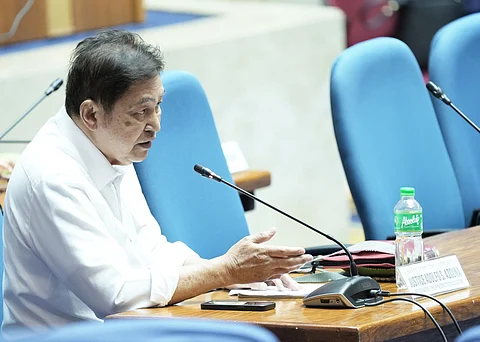
- NEWS
- the EDIT
- COMMENTARY
- BUSINESS
- LIFE
- SHOW
- ACTION
- GLOBAL GOALS
- SNAPS
- DYARYO TIRADA
- MORE

A Charter framer on Thursday warned that the Supreme Court (SC) might consider a grave abuse of discretion on the part of the House of Representatives if it is found to be non-compliant with the constitutionally mandated timeline when it impeached Vice President Sara Duterte on 5 February.
Former SC associate justice Adolfo Azcuna, a member of the Constitutional Commission that crafted the 1987 Constitution, argued that although the House has the sole power to initiate impeachment cases, the rules under initiation are still governed by the specific procedures of the charter.
This indicates that the high court can invoke judicial oversight and intervene in the matter concerning impeachment — notwithstanding the constitutional principle of separation of powers — if the House is found non-compliant with the timelines and referrals outlined in the Constitution.
“So as far as the compliance with those specific procedures is concerned, the Supreme Court, I think, can ask questions,” Azcuna said in an interview. “I believe that if these time-bound procedures are not complied with, the Supreme Court may consider a grave abuse [of discretion].”
Azcuna’s statement came on the heels of reports of the House’s refusal to respond to three of the many clarifications sought by the SC concerning the impeachment, including whether the fourth impeachment complaint was properly circulated and perused by 215 lawmakers who signed it.
The House, through its legal counsel, the Office of the Solicitor General, likewise declined to answer which committee or office prepared the draft of the articles of impeachment when it was completed.
Invoking the separation of powers, the House contended that these “internal” matters are beyond the jurisdiction and scrutiny of the SC, asserting that they were “not governed by any specific constitutional provision or House rule.”
“This restraint on the part of Respondent House is grounded on no less than the separation of powers enshrined in our Constitution. Being a co-equal branch, the Congress is entitled to respect with regard to those matters which are within its exclusive jurisdiction,” read a portion of the 120-page document containing the House’s response to the SC.
The SC’s clarificatory questions to the House were in response to the twin petitions filed by VP Duterte and Mindanaoan lawyers who challenged the legality of the fourth impeachment, accusing the House leadership of manipulating the timeline.
Duterte claimed that House Secretary-General Reginald Velasco deliberately froze the first three impeachment complaints to avoid triggering the one-year constitutional bar while awaiting the fourth impeachment complaint.
The House secretary general is constitutionally mandated to refer an impeachment complaint to the Speaker’s office, and within 10 session days from receipt, the document shall be included in the order of business.
Afterward, the complaint should then be referred within three session days to the House Committee on Justice, which will determine whether the complaint is sufficient in form and substance before endorsing its report on the plenary for a resolution.
The fourth impeachment complaint, which was transmitted to the Senate for trial, contains seven articles of impeachment, accusing the VP of graft and corruption, bribery, betrayal of public trust, culpable violation of the Constitution, and other high crimes.
The filing of the fourth complaint came only two months after the first three impeachment complaints were lodged by civilian and religious groups in December and endorsed by some members of the House.
The Constitution grants the House the sole power to initiate impeachment of top government officials, including the President, the Vice President, members of the Supreme Court, and members of constitutional commissions.
“But the procedure of treating a complaint filed before [the House], is governed by specific procedures in the Constitution itself. And the question of the Supreme Court, I believe, has to do with the compliance with the procedure specifically outlined in the Constitution itself,” Azcuna stressed.
Mamamayang Liberal Rep. Leila de Lima, expected to join the panel tasked to prosecute the VP, had accused the SC of a potential “judicial overreach” for directing Congress to justify the legality of the impeachment complaint.
She implied that the SC might have gone too far, and that its directive — which she claimed were merely minor procedural matters — could cast doubt on the petition's validity and the legislature’s constitutional role.
The House prosecution panel has long insisted that the one-year bar rule was “never circumvented” because the initiation was only triggered when the fourth impeachment complaint was verified and signed by more than the required one-third votes, allowing it to bypass committee hearings and be transmitted directly to the Senate for trial.
